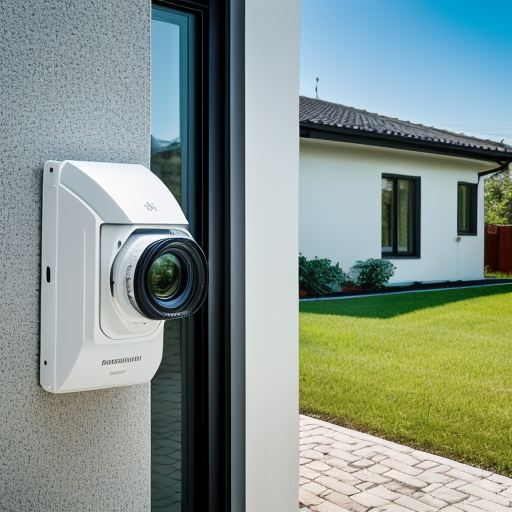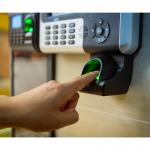Table of Contents
- Benefits Of Wireless Security Systems
- Ease Of Installation
- Remote Control Through Smartphone App
- Motion Detectors
- Door Sensors
- Cameras For Real-Time Alerts
- Wireless Vs. Wired Systems
- Diy Wireless Security Systems
- Professional Installation Of Wireless Security Systems
- Choosing The Best Wireless Security System For Your Home
- Frequently Asked Questions About Home Securities
- Conclusion
As a home security equipment expert, I understand the importance of protecting your home and loved ones.
One of the most popular types of home security equipment is wireless security systems. These systems offer numerous benefits that traditional wired systems cannot match.
Wireless security systems are easy to install and require no drilling or wiring, making them an ideal choice for renters or homeowners who do not want to damage their walls. They also allow you to control your system remotely through a smartphone app, giving you peace of mind when you are away from home.
Additionally, many wireless systems come with motion detectors, door sensors, and cameras that can alert you in real-time if there is any suspicious activity on your property.
This article will explore the different types of wireless security systems available and how they can protect your home.
Benefits Of Wireless Security Systems
Are you tired of feeling like a prisoner in your own home? Do you want to feel safe and secure without breaking the bank? Look no further than wireless security systems.
Not only are they affordable, but they also provide reliable protection for your home. Gone are the days of complicated installations and expensive equipment.
Wireless security systems offer an easy-to-install solution that can be customized to fit your specific needs. You can create a tailored system that fits your budget with options such as door sensors, motion detectors, and cameras.
But affordability doesn’t mean sacrificing quality. In fact, wireless security systems have proven themselves to be just as reliable as traditional wired systems.
With advanced technology and constant monitoring capabilities, these systems ensure that your home is always protected – even when you’re not there. So why settle for anything less than top-notch security at an affordable price?
Ease Of Installation
Now that we’ve discussed the benefits of wireless security systems let’s dive into another advantage: ease of installation. Installing a wired system can be time-consuming and may require professional assistance. With wireless systems, however, you can easily install it yourself in just a few hours without any extensive wiring.
When comparing costs between wired and wireless systems, the latter often comes out as more affordable due to the lack of additional labor for installation. Wireless systems don’t require drilling holes or running wires through walls and ceilings, which can save on repair costs.
Another benefit of wireless systems is their ability to integrate with other home security devices such as cameras and smart locks. By integrating these devices together, homeowners have greater control over their home security and can monitor all aspects from one central hub. This added convenience provides peace of mind knowing a fully integrated system protects your entire home.
Cost comparison:
- Wireless systems are typically more affordable than wired ones due to easier installation.
- Repair costs for damage caused by drilling holes or running wires are also eliminated.
Security system integration:
- Wireless systems allow for easy integration with other devices such as cameras and smart locks.
- Homeowners have greater control over their overall security with an integrated system.
- Monitoring everything from one central hub adds convenience and peace of mind.
In summary, not only are wireless security systems convenient in terms of installation but they’re also cost-effective when compared to traditional wired options. Furthermore, by integrating various components like cameras and smart locks together under one system umbrella, homeowners enjoy better protection while having complete control at their fingertips.
Remote Control Through Smartphone App
I’m an expert in home security equipment, and I’ve seen a lot of advances in remote control through smartphone apps.
It’s become easier for homeowners to access their security systems remotely, giving them more control over their security.
With smartphone control, users can customize their security settings, arm or disarm their systems, and even receive alerts when something’s amiss.
It’s a great way to keep your home safe and secure, with just the touch of a button.
Remote Accessibility
Are you looking for a home security system that can be easily accessed even when you’re not at home? Then, wireless security systems with remote accessibility might just be the perfect fit for your needs.
With this feature, homeowners can control and monitor their security equipment using their smartphone apps from anywhere. One of the main advantages of having remote accessibility in your wireless security system is convenience. You no longer have to worry about forgetting to arm or disarm your alarm before leaving the house since you can do it remotely through your mobile device.
Additionally, if there’s any suspicious activity in your property while you’re away, you’ll get real-time alerts on your phone, allowing you to take immediate action. On the other hand, one drawback of remote accessibility is that it requires an internet connection. If there’s a power outage or network failure in your area, then you won’t be able to access your security system remotely.
However, some companies offer backup batteries and cellular data options as alternatives to keep your system running during such situations. Overall, having remote accessibility greatly enhances the functionality and efficiency of wireless security systems for modern homeowners seeking added peace of mind.
Smartphone Control
Now that we’ve discussed the benefits of remote accessibility, let’s dive into another useful feature for wireless security systems – smartphone control. With this advancement in technology, homeowners can now arm or disarm their alarms, view live footage from their cameras and receive notifications straight to their smartphones through dedicated apps, providing maximum convenience.
One significant advantage of smartphone control is its ease of use. Since most people always have their phones with them, controlling your security system has never been easier. You don’t need to memorize codes or carry a separate device like a key fob since you can do everything on your phone.
Plus, if there are multiple users in your household, each person can download the app on their phone and manage the system independently.
On the other hand, one potential disadvantage of relying solely on smartphone control is that it may not be practical in every situation. In some cases where you cannot access your phone due to battery issues or network problems, backup options such as physical keypads or voice assistants could come in handy. Nonetheless, smartphone control remains an excellent addition to any modern wireless security system for its added functionality and user-friendliness.
Motion Detectors
As a home security equipment expert, I understand the importance of motion detectors in keeping your property safe. These devices can detect any movement within their range and alert you immediately when triggered. However, false alarms with motion detectors are a common issue that many homeowners face.
That’s why choosing the right type of motion detector for your needs is crucial. Pet friendly motion detectors are an excellent option for pet owners who want to secure their homes without worrying about false alarms caused by their furry friends. These sensors use advanced technology to differentiate between human and animal movements, ensuring that your pets won’t trigger them accidentally. With pet friendly motion detectors, you can have peace of mind knowing that your home is fully protected against intruders while still allowing your pets to move around freely.
False alarms with motion detectors can be frustrating and time-consuming, especially if they occur frequently. To prevent this from happening, make sure that your motion detectors are installed correctly and positioned in areas where there’s no direct sunlight or heat sources. Additionally, ensure that they’re not facing any moving objects such as trees or bushes that may trigger them unnecessarily.
Investing in high-quality wireless security systems with reliable motion detection capabilities is one of the best ways to protect your home and family from potential threats. Pet friendly options help reduce unnecessary alerts while also providing maximum protection against burglars and other unwanted visitors.
Don’t wait until it’s too late; upgrade your home security today!
Door Sensors
Regarding home security, door sensors are one of the most important components you can install. Not only do they alert you to when a door has been opened, but they also provide an extra layer of protection against burglars and intruders.
Sensor placement is key when installing door sensors. You want to make sure that the sensor is placed on the door frame so that it detects any movement in or out of the doorway.
Additionally, some models come equipped with door jamming detection technology which alerts you if someone tries to force open your door.
Overall, investing in door sensors for your home security system is a wise decision. By strategically placing them around your entry points and ensuring proper installation, you can rest assured that your home is protected from potential break-ins or unwanted visitors without constantly worrying about its safety.
Cameras For Real-Time Alerts
When it comes to home security, indoor and outdoor cameras are both essential.
Indoor cameras are great for monitoring activity inside the home, while outdoor cameras help provide visibility into what’s happening outside.
They both provide real-time alerts and can be connected to your phone, so you’ll always know what’s going on.
Overall, having both types of cameras is key for a comprehensive home security system.
Indoor Cameras
Are you concerned about the safety of your home while you’re away?
Indoor cameras are an excellent addition to any wireless security system, providing real-time alerts and peace of mind. These cameras can be mounted in various locations throughout your home, such as living rooms, entryways, or bedrooms.
However, it’s important to consider privacy concerns when installing indoor cameras. Some homeowners worry that their personal space is being invaded with constant surveillance.
Many modern systems offer features like motion detection and selective recording to address this concern. Additionally, hidden cameras can provide a discreet way to monitor activity without sacrificing privacy.
Overall, indoor cameras are an integral part of a comprehensive security system for any homeowner who prioritizes safety. With advancements in technology and customizable settings, these devices offer protection, ease-of-use, and flexibility while keeping privacy concerns at the forefront of design considerations.
Outdoor Cameras
Now that we’ve discussed the benefits of indoor cameras for real-time alerts, let’s move on to their outdoor counterparts.
Outdoor cameras are a crucial component of any comprehensive security system as they offer an extra layer of protection by monitoring your property’s exterior 24/7.
With night vision capabilities and weather-resistant features, these cameras can capture clear footage in even the harshest conditions. This ensures that you’re always aware of what’s happening outside your home, whether it’s suspicious activity or unexpected visitors.
When choosing an outdoor camera, it’s important to consider its placement and angle carefully. A well-positioned camera can capture vital information such as license plates, while an improperly placed one may miss critical details.
With modern systems offering customizable settings and remote access via smartphone apps, keeping tabs on your property has never been easier.
In conclusion, including outdoor cameras with night vision capabilities and weather-resistant features is essential for achieving maximum security coverage for your home. By strategically placing them around your property and customizing their settings according to your needs, you’ll be able to keep track of everything happening outside – all without sacrificing privacy concerns.
Wireless Vs. Wired Systems
When it comes to home security systems, homeowners often face the dilemma of choosing between wireless and wired options. Both have advantages and disadvantages, so it is essential to understand them before deciding.
One advantage of wireless systems is their ease of installation. Unlike wired systems that require extensive drilling and wiring, wireless systems can be easily installed without any hassle. Moreover, they are portable, meaning you can move them from one place to another effortlessly.
However, this convenience does come at a cost – as compared to wired systems; wireless ones tend to be more expensive.
On the other hand, wired systems offer greater reliability and longevity than their wireless counterparts. Since they rely on physical connections rather than radio signals like wireless systems do, there is no risk of interference or signal loss due to environmental factors like walls or even weather conditions. Additionally, since they’re hardwired into your home’s electrical system, you don’t need to worry about replacing batteries every few months.
While they may take longer to install initially and cost less upfront than wireless models- for those looking for long-term solutions with minimal maintenance costs down the road – a traditional wired setup might just be worth considering!
Diy Wireless Security Systems
When it comes to wireless security systems, the DIY option has become increasingly popular among homeowners. These systems are easy to install and come equipped with a range of security features that can rival those of professionally installed systems.
One major advantage of choosing a DIY wireless system is the cost comparison. Homeowners who opt for this route can save money on installation fees as well as ongoing monitoring costs.
Additionally, many companies offer packages that allow you to customize your system based on your specific needs.
Another factor to consider when comparing different DIY wireless security systems is their respective security features. Look for options like motion sensors, door and window contacts, and surveillance cameras that provide live feeds directly to your smartphone or tablet.
With these advanced features in place, you’ll have peace of mind knowing that your home is protected around the clock without breaking the bank on expensive equipment installations.
Professional Installation Of Wireless Security Systems
Now that we’ve discussed DIY wireless security systems, let’s explore the benefits of professional installation. While installing a system yourself may seem like a cost-effective option, there are advantages to having a professional do it for you.
Firstly, professional installers have experience and training to ensure your system is set up correctly. They can also offer guidance on where to place sensors, cameras, and other equipment for optimal coverage. This expertise can result in fewer false alarms and more accurate detection.
Secondly, many home security companies offer packages that include both equipment and installation at competitive prices. When comparing costs between DIY and professional options, consider the initial investment and potential long-term savings from reliable monitoring services.
To evaluate customer satisfaction with different providers, look into online reviews or ask for referrals from friends and family. A company with high ratings in areas such as responsiveness to alerts or ease of use may be worth considering over one with lower ratings.
Cost comparison:
- Compare the upfront costs of purchasing equipment versus buying a package deal with installation included.
- Consider potential long-term savings from reliable monitoring services offered by certain providers.
- Review any additional fees or charges associated with each option (i.e., maintenance costs).
Customer satisfaction:
- Research online reviews or ask for referrals from friends and family.
- Look for quality service indicators such as responsiveness to alerts or user-friendly interfaces.
- Choose a provider with high ratings in areas important to you.
The professional installation offers peace of mind knowing that your system is properly installed by experts who stand behind their work. By weighing the cost comparison against potential long-term savings and evaluating customer satisfaction ratings before choosing a provider, you can decide which type of wireless security system best fits your needs.
Choosing The Best Wireless Security System For Your Home
When it comes to choosing the best wireless security system for your home, there are several factors to consider. One of the most important things to think about is cost comparison. While you don’t want to skimp on quality, you also don’t want to overspend on a system that has features you won’t use or need.
Another thing to keep in mind when selecting a wireless security system is compatibility with smart home devices. Many people now have Alexa or Google Home assistants and other gadgets that they use daily. It’s essential to choose a system that will work seamlessly with these devices so that you can quickly arm/disarm your alarm or view camera footage from anywhere in your home.
When weighing up different systems, make sure you do thorough research into each option before making any final decisions. Look at reviews online and seek recommendations from friends and family members who may already have a wireless security system installed in their own homes. By finding the right fit for your needs, you’ll be able to enjoy peace of mind knowing that your property is protected around the clock without breaking the bank.
| Feature | Pros | Cons | Price Range |
|---|---|---|---|
| SimpliSafe Wireless Security System | Easy DIY installation; affordable monthly monitoring fees | Limited integration with smart home devices | $229 – $489 |
| Ring Alarm Wireless Security Kit | User-friendly app; excellent video doorbell feature | Expensive add-ons ; limited number of sensors included | $199 – $399 |
| Nest Secure Wireless Alarm System | Sleek design; robust mobile app | High upfront costs; no professional monitoring available | $399 – $498 |
Table: Cost Comparison of Popular Wireless Security Systems
Frequently Asked Questions About Home Securities
When it comes to choosing between wireless and wired security systems, there are pros and cons to both options.
While a wired system may provide more reliable connections and less risk of interference or hacking, wireless systems offer greater flexibility in terms of installation locations and easier maintenance.
In modern homes where smart devices reign supreme, the effectiveness of wireless security systems has greatly improved with advancements in technology such as encrypted signals and smartphone integration.
As a home security equipment expert, I recommend carefully considering your specific needs and preferences before deciding which type of system is best for you.
Wireless security systems are becoming increasingly popular because of their convenience and ease of installation. However, they do come with potential vulnerabilities that hackers can exploit.
To ensure the safety of your wireless system, it is important to follow some tips for securing it. These include changing default passwords, regularly updating software and firmware, enabling encryption, using a strong Wi-Fi password, and limiting access to the network.
Implementing these measures can significantly reduce the risk of a successful hack on your wireless security system. As an expert in home security equipment, I strongly recommend taking these steps to protect your property and loved ones from any potential threats.
During a power outage, wireless security systems may lose their connection to the internet and therefore be unable to transmit alerts or footage.
However, many modern wireless security systems come equipped with battery backups that allow them to continue functioning even in an extended power failure.
Additionally, some systems have alternative communication methods such as cellular backup or radio frequency transmission, that can help maintain connectivity during an outage.
As a home security equipment expert, I highly recommend investing in a system with these features to ensure your property remains protected at all times.
As the old adage goes, you get what you pay for. When choosing between a wireless or wired security system, there are pros and cons to consider.
Yes, wireless systems can be more expensive in terms of equipment costs compared to their wired counterparts. However, the installation process is much simpler with no need for drilling holes and running wires through walls.
As a home security equipment expert, I recommend weighing the cost versus convenience factor before deciding. Investing in a reliable security system is crucial for protecting your family and belongings.
Regular upkeep is crucial for ensuring the optimal performance of wireless security systems.
As a home security equipment expert, I recommend conducting routine maintenance checks to ensure that all components function as they should.
Troubleshooting tips can also be useful when issues arise, such as checking batteries and resetting devices.
It’s important to note that while wireless systems may require less maintenance than wired ones, neglecting regular upkeep can lead to system malfunctions or even failures.
By staying on top of maintenance tasks, homeowners can rest assured that their wireless security systems will continue to provide reliable protection.
Conclusion
As a home security equipment expert, I want to assure you that wireless security systems are reliable and effective. While some may question their security compared to wired systems, the truth is that technological advances have made them just as secure. Sure, anything can be hacked nowadays, but your wireless system is protected with proper encryption and other safeguards.
Moreover, think of the peace of mind you’ll receive knowing that your home is being monitored even during power outages!
And while it’s true that wireless systems can be more expensive upfront than wired ones, they often pay for themselves over time by saving on installation costs. Maintenance requirements are minimal – keep an eye on battery levels and perform occasional updates.
In short, don’t let fear or misconceptions hold you back from investing in a wireless home security system. It’s worth every penny for the added safety and comfort it provides. Protect what matters most to you – your family and your property – with confidence using wireless security equipment.







